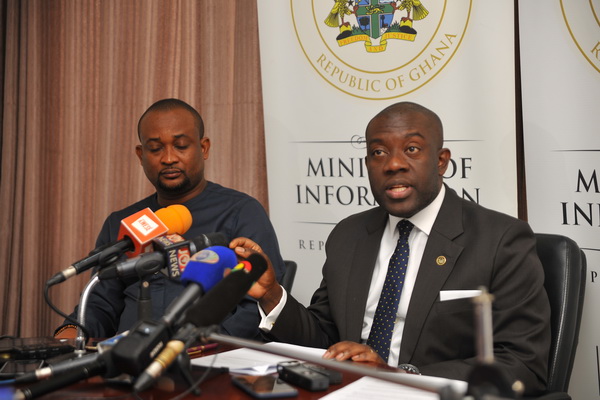Published
6 years agoon

He, therefore, dismissed the assertion that the lifting of the partial lockdown in parts of the country will derail the fight against the spread of the virus.
Speaking at the government’s periodic public briefing on national COVID-19 response in Accra yesterday, the minister said the government was in the process of ensuring that the masks were made available to the public.
He said the government had developed guidelines to enable people to make their own nose masks to ensure that standards and safety were not compromised and added that the guidelines would be put out shortly.
He said all other preventive measures, such as adhering to social distancing, washing of hands frequently, using at least 70 per cent alcohol-based hand sanitisers, closure of borders and the ban on public gatherings were still in full force.
Why lifting lockdown?
Mr Nkrumah emphasised that the imposition of the movement restriction was not because of the number of cases the country had recorded but as was explained by the President, it was to enable health officials to collect the requisite data needed
to inform the next line of action for the national response and that objective had been achieved.
Mr Nkrumah said the enhanced preventive measures had only shifted the role of the security agencies from enforcing the movement restrictions to enforcing adherence to all the other measures.
That, he said, included social distancing and the wearing of the mask in public.
Mask care
Speaking to the Daily Graphic after the briefing, the Head of Health Promotion at the Ghana Health Service (GHS), Dr Dacosta Aboagye, used the opportunity to remind the public that while the wearing of the mask was necessary because it provided minimal protection, especially in areas where social distancing was difficult, it had to be used and disposed of to get that minimal protection.
He said the home-made nose masks and all reusable masks should be properly disinfected before first use; washed, rinsed under running water, dried in the open sun and ironed before every reuse.
Mask registration, specifications
In a related development, the Food and Drugs Authority (FDA) has reiterated that locally made masks should be registered to ensure they were of standard to give the required protection.
The FDA has, therefore, released the requirements for the registration of home-made nose masks.
They include completing an application form for Class One Medical Devices (available online at the FDA website www.fdaghana.gov.gh), the payment of an application fee of GH¢750, a licensing fee of GH¢100 and analysis fee of GH¢1,300, in addition to an inclusion of 12 samples.
In terms of specifications, the FDA said it should be 10 inches from cheek-to-cheek with a width of six inches and should have three layers of not less than 0.759mm among others.
Ashanti enforces
From Kumasi, Daniel Kenu, reports that the Ashanti Regional Security Council has begun the enforcement of the wearing of nose masks in the Central Business District of Kumasi.
The Regional Minister, Mr Simon Osei-Mensah, said those without the mask were to be turned back.
Despite the directive, Daily Graphic checks at the central business district revealed that there were a lot of people without the mask.
Contrary to the minister’s warning, there was no task force in town to ensure strict adherence to the directive.
It was more of an individual’s precautionary measure than a compulsion.
Source: Graphic.com
